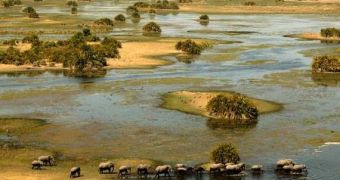Given the fact that a considerable amount of Botswana's national income stems from tourism, it is no wonder that both local people and high officials there are highly preoccupied with the fact that the Okavango Delta is beginning to undergo significant transformations as a result of climate change.
Recent studies conducted by Wame L. Hambira, a researcher from the University of Botswana, indicate that global changes in weather patterns are likely to cause the drying out of the swamps in this part of the world. As well as this, local forests might be replaced by grasslands.
To be more precise: as annual rainfalls in Botswana drop, the Okavango Delta will simply find itself lacking sufficient water sources so as to support its ecosystems.
According to ENN, Wame L. Hambira made it clear that: “The declining precipitation and increasing temperatures have implications for the amount of inflow into the delta.”
This means that most local species will either become extinct, or be forced to move on to other regions.
Seeing how most of the people who visit Botswana wish to see both the Okavango Delta and the animals there, it is not difficult to guess that tourist activities in the region will also suffer a downfall.
Whereas people from all parts of the world gather here for activities such as camping expeditions, photography tours, bird-watching and safaris, indigenous communities have a much closer relationship with said delta.
Thus, they see it as a water source, a place where they can fish and grow their crops, and as a part of their culture. Therefore, the destruction of the Okavango Delta will severely impact on their lifestyle.
Presently, Botswana's Ministry of Environment, Wildlife and Tourism is working towards coming up with ways to fight back the potentially devastating effects of climate change, their end-goal being to keep both the national economy and the local ecosystems out of harm's way.

 14 DAY TRIAL //
14 DAY TRIAL //